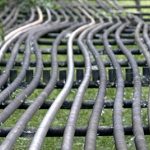At least five people died and dozens of others were rushed to hospital late on Sunday after an oil pipeline exploded in Nigeria in a blast that the authorities believe was caused by oil thieves who ruptured the pipeline belonging to the Nigerian National Petroleum Corporation (NNPC).
The explosion occurred late on Sunday evening local time in Nigeria in the Ekoro area of Abule-Egba in the Lagos State, and dozens of people were feared dead.
The explosion is thought to be the result of illegal activities by the so-called pipeline vandals in Nigeria–thieves who frequently try to steal oil and petroleum products from pipelines by puncturing them.
The initial explosion was followed by others, while the fires from the explosions have thrown the residents in the area into panic.
NNPC’s Group managing director, Mele Kyari, arrived on Monday for an on-the-spot assessment of the pipeline explosion, the Nigerian state oil corporation said on Twitter.
“It’s unfortunate we lost 5 lives to this inferno, with many in critical condition in the hospitals, all due to unpatriotic acts of vandals along our Pipeline Right of Way, who make insertions into the pipelines to steal products, leading to disasters such as this,” Kyari said.
According to NNPC’s head, the corporation is working on a daily basis with Nigeria’s security agencies to try to curb the ‘oil stealing’ phenomenon.
“Nigerians must know that these acts of vandals are happening within communities and if they are allowed to continue, then they will eventually kill all of us!,” Kyari said.
NNPC raised the alarm last year that oil pipeline vandalism in Nigeria was soaring, with the number of incidents of breached pipelines surging by 115 percent in July compared to June.
Pipeline vandalism, as well as pipeline sabotages by militants in Nigeria’s oil-rich Niger Delta area, has plagued Nigeria’s oil production and exports for years. Over the past year and a half, militant activity has subsided, allowing Nigeria to boost its crude oil production, and also making Africa’s largest oil producer a full-fledged participant in the production cuts of the OPEC+ coalition.







